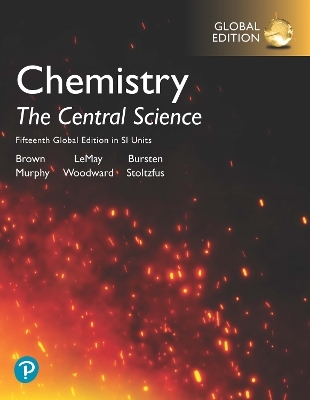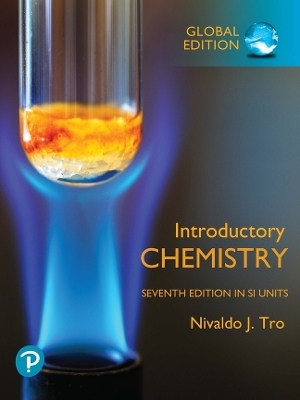
E-COMM - Tool ISBN for Pearson Mastering Chemistry - Instant Access - for Chemistry: The Central Science in SI Units, 15th Global Edition
Pearson Education Limited (Hersteller)
978-1-292-40773-9 (ISBN)
- Titel nicht im Sortiment
- Artikel merken
Accurate, data-driven authorship with expanded interactivityleads to greater student engagement
Unrivaled problemsets, notable scientific accuracy and currency, and remarkable clarity havemade Chemistry: The Central Science the leading generalchemistry text for more than a decade. Trusted, innovative, and calibrated, thetext increases conceptual understanding and leads to greater student success ingeneral chemistry by building on the expertise of the dynamic author team ofleading researchers and award-winning teachers.
MasteringTMChemistry is not included. Students, if Mastering isa recommended/mandatory component of the course, please ask your instructor forthe correct ISBN and course ID. Mastering should only be purchased whenrequired by an instructor. Instructors, contact your Pearson rep for moreinformation.
Mastering is an online homework,tutorial, and assessment product designed to personalize learning and improveresults. With a wide range of interactive, engaging, and assignable activities,students are encouraged to actively learn and retain tough course concepts.
THEODORE L. BROWN received his Ph.D. fromMichigan State University in 1956. Since then, he has been a member of the facultyof the University of Illinois, Urbana-Champaign, where he is now Professor of Chemistry,Emeritus. He served as Vice Chancellor for Research, and Dean of The Graduate College,from 1980 to 1986, and as Founding Director of the Arnold and Mabel Beckman Institutefor Advanced Science and Technology from 1987 to 1993. Professor Brown has beenan Alfred P. Sloan Foundation Research Fellow and has been awarded a GuggenheimFellowship. In 1972 he was awarded the American Chemical Society Award for Researchin Inorganic Chemistry and received the American Chemical Society Award for DistinguishedService in the Advancement of Inorganic Chemistry in 1993. He has been elected aFellow of the American Association for the Advancement of Science, the AmericanAcademy of Arts and Sciences, and the American Chemical Society. H. EUGENE LEMAY, JR., received his B.S. degreein Chemistry from Pacific Lutheran University (Washington) and his Ph.D.in Chemistryin 1966 from the University of Illinois, Urbana-Champaign. He then joined the facultyof the University of Nevada, Reno, where he is currently Professor of Chemistry,Emeritus. He has enjoyed Visiting Professorships at the University of North Carolinaat Chapel Hill, at the University College of Wales in Great Britain, and at theUniversity of California, Los Angeles. Professor LeMay is a popular and effectiveteacher, who has taught thousands of students during more than 40 years of universityteaching. Known for the clarity of his lectures and his sense of humor, he has receivedseveral teaching awards, including the University Distinguished Teacher of the YearAward (1991) and the first Regents' Teaching Award given by the State of NevadaBoard of Regents (1997). BRUCE E. BURSTEN received his Ph.D. inChemistry from the University of Wisconsin in 1978. After two years as a NationalScience Foundation Postdoctoral Fellow at Texas A&M University, he joined thefaculty of The Ohio State University, where he rose to the rank of DistinguishedUniversity Professor. In 2005, he moved to the University of Tennessee, Knoxville,as Distinguished Professor of Chemistry and Dean of the College of Arts and Sciences.Professor Bursten has been a Camille and Henry Dreyfus Foundation Teacher-Scholarand an Alfred P. Sloan Foundation Research Fellow, and he is a Fellow of both theAmerican Association for the Advancement of Science and the American Chemical Society.At Ohio State he has received the University Distinguished Teaching Award in 1982and 1996, the Arts and Sciences Student Council Outstanding Teaching Award in 1984,and the University Distinguished Scholar Award in 1990. He received the Spiers MemorialPrize and Medal of the Royal Society of Chemistry in 2003, and the Morley Medalof the Cleveland Section of the American Chemical Society in 2005. He was Presidentof the American Chemical Society for 2008. In addition to his teaching and serviceactivities, Professor Bursten's research program focuses on compounds of the transition-metaland actinide elements. CATHERINE J. MURPHY received two B.S. degrees,one in Chemistry and one in Biochemistry, from the University of Illinois, Urbana-Champaign,in 1986. She received her Ph.D. in Chemistry from the University of Wisconsin in1990. She was a National Science Foundation and National Institutes of Health PostdoctoralFellow at the California Institute of Technology from 1990 to 1993. In 1993, shejoined the faculty of the University of South Carolina, Columbia, becoming the GuyF. Lipscomb Professor of Chemistry in 2003. In 2009 she moved to the Universityof Illinois, Urbana-Champaign, as the Peter C. and Gretchen Miller Markunas Professorof Chemistry. Professor Murphy has been honored for both research and teaching asa Camille Dreyfus Teacher-Scholar, an Alfred P. Sloan Foundation Research Fellow,a Cottrell Scholar of the Research Corporation, a National Science Foundation CAREERAward winner, and a subsequent NSF Award for Special Creativity. She has also receiveda USC Mortar Board Excellence in Teaching Award, the USC Golden Key Faculty Awardfor Creative Integration of Research and Undergraduate Teaching, the USC MichaelJ. Mungo Undergraduate Teaching Award, and the USC Outstanding Undergraduate ResearchMentor Award. Since 2006, Professor Murphy has served as a Senior Editor for theJournal of Physical Chemistry. In 2008 she was elected a Fellow of the AmericanAssociation for the Advancement of Science. Professor Murphy's research programfocuses on the synthesis and optical properties of inorganic nanomaterials, andon the local structure and dynamics of the DNA double helix. PATRICK M. WOODWARD received B.S. degreesin both Chemistry and Engineering from Idaho State University in 1991.He receiveda M.S. degree in Materials Science and a Ph.D. in Chemistry from Oregon State Universityin 1996. He spent two years as a post-doctoral researcher in the Department of Physicsat Brookhaven National Laboratory. In1998, he joined the faculty of the ChemistryDepartment at The Ohio State University where he currently holds the rank of Professor.He has enjoyed visiting professorship sat the University of Bordeaux in France andthe University of Sydney in Australia. Professor Woodward has been an Alfred P.Sloan Foundation Research Fellow and a National Science Foundation CAREER Awardwinner. He currently serves as an Associate Editor to the Journal of Solid StateChemistry and as the director of the Ohio REEL program, an NSF-funded center thatworks to bring authentic research experiments into the laboratories of first- andsecond-year chemistry classes in 15 colleges and universities across the state ofOhio. Professor Woodward's research program focuses on understanding the links betweenbonding, structure, and properties of solid-state inorganic functional materials. MATTHEW W. STOLTZFUS received his B.S. degree inChemistry from Millersville University in 2002 and his Ph. D. in Chemistry in2007from The Ohio State University. He spent two years as a teaching postdoctoral assistantfor the Ohio REEL program, an NSF-funded center that works to bring authentic researchexperiments into the general chemistry lab curriculum in 15 colleges and universitiesacross the state of Ohio. In 2009, he joined the faculty of Ohio State where hecurrently holds the position of Chemistry Lecturer. In addition to lecturing generalchemistry, Stoltzfus accepted the Faculty Fellow position for the Digital FirstInitiative, inspiring instructors to offer engaging digital learning content tostudents through emerging technology. Through this initiative, he developed an iTunesUgeneral chemistry course, which has attracted over 120,000 students from all overthe world. Stoltzfus has received several teaching awards, including the inauguralOhio State University2013 Provost's Award for Distinguished Teaching by a Lecturerand he is recognized as an Apple Distinguished Educator.
Introduction: Matter,Energy, and Measurement
2. Atoms, Molecules, and Ions
3. Chemical Reactions and Reaction Stoichiometry
4. Reactions in Aqueous Solution
5. Thermochemistry
6. Electronic Structure of Atoms
7. Periodic Properties of the Elements
8. Basic Concepts of Chemical Bonding
9. Molecular Geometry and Bonding Theories
10. Gases
11. Liquidsand IntermolecularForces
12. Solidsand Modern Materials
13. Properties of Solutions
14. Chemical Kinetics
15. Chemical Equilibrium
16. Acid—Base Equilibria
17. Additional Aspects of Aqueous Equilibria
18. Chemistry of the Environment
19. Chemical Thermodynamics
20. Electrochemistry
21. NuclearChemistry
22. Chemistry of the Nonmetals
23. Transition Metals and Coordination Chemistry
24. TheChemistry of Life: Organic and Biological Chemistry
Appendices
Mathematical Operations
Properties of Water
ThermodynamicQuantities for Selected Substances at 298.15 K (25ο C)
Aqueous EquilibriumConstants
Standard ReductionPotentials at 25ο C
Answers to SelectedExercises
Answers to Go Figure
Answer to SelectedPractice Exercises
Glossary
Photo and Art Credits
| Erscheint lt. Verlag | 26.10.2021 |
|---|---|
| Verlagsort | Harlow |
| Sprache | englisch |
| Themenwelt | Schulbuch / Wörterbuch |
| Naturwissenschaften ► Chemie | |
| ISBN-10 | 1-292-40773-5 / 1292407735 |
| ISBN-13 | 978-1-292-40773-9 / 9781292407739 |
| Zustand | Neuware |
| Haben Sie eine Frage zum Produkt? |
aus dem Bereich


